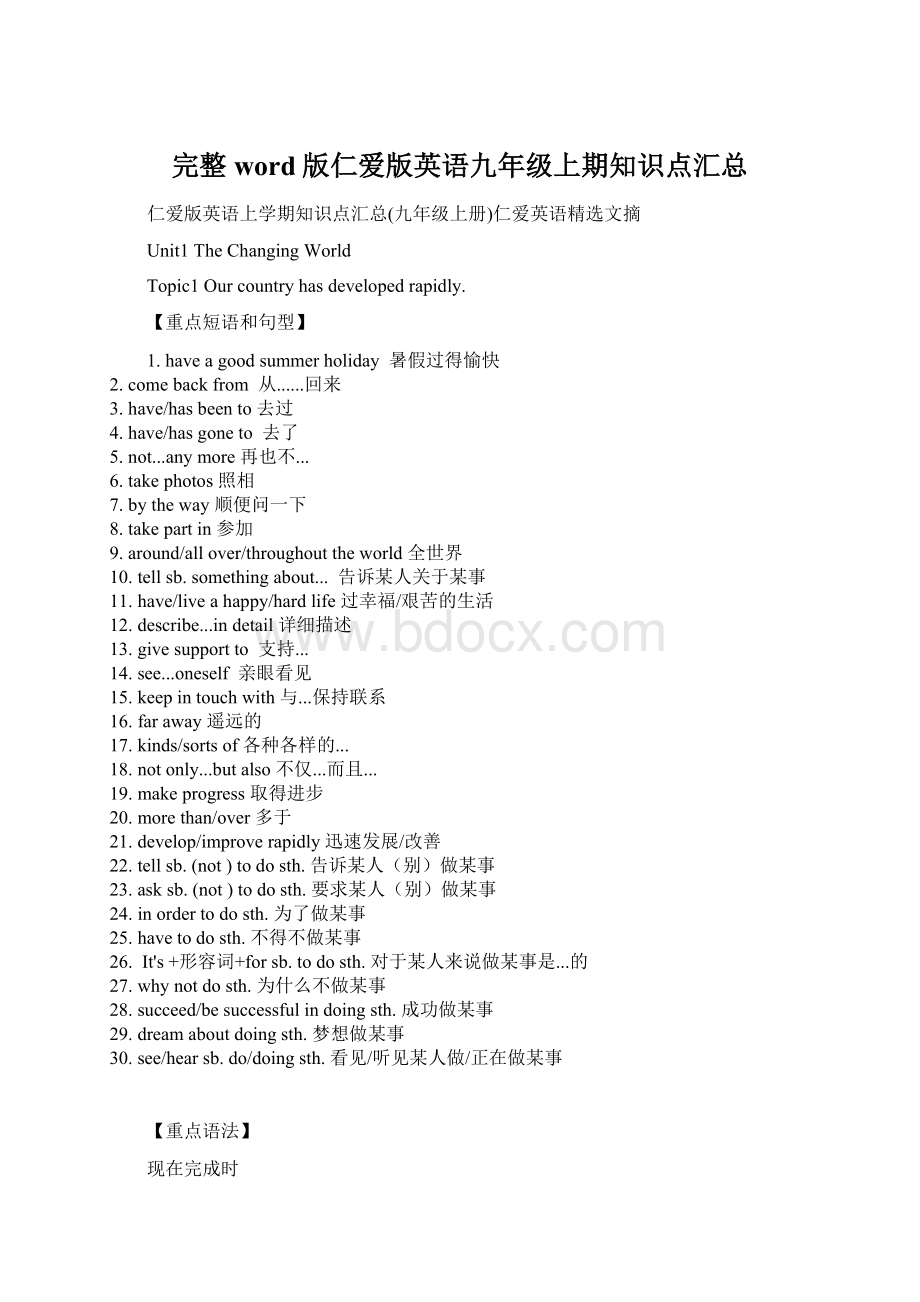完整word版仁爱版英语九年级上期知识点汇总Word文件下载.docx
《完整word版仁爱版英语九年级上期知识点汇总Word文件下载.docx》由会员分享,可在线阅读,更多相关《完整word版仁爱版英语九年级上期知识点汇总Word文件下载.docx(16页珍藏版)》请在冰豆网上搜索。

与...保持联系
16.
faraway
遥远的
17.
kinds/sortsof
各种各样的...
18.
notonly...butalso
不仅...而且...
19.
makeprogress
取得进步
20.
morethan/over
多于
21.
develop/improverapidly
迅速发展/改善
22.
tellsb.(not)todosth.
告诉某人(别)做某事
23.
asksb.(not)todosth.
要求某人(别)做某事
24.
inordertodosth.
为了做某事
25.
havetodosth.
不得不做某事
26.
It'
s+形容词+forsb.todosth.
对于某人来说做某事是...的
27.
whynotdosth.
为什么不做某事
28.
succeed/besuccessfulindoingsth.
成功做某事
29.
dreamaboutdoingsth.
梦想做某事
30.
see/hearsb.do/doingsth.
看见/听见某人做/正在做某事
【重点语法】
现在完成时
一.现在完成时的基本结构
肯定句:
主语+have/has+动词的过去分词+其他
否定句:
主语+have/has+not+动词过去分词+其他
一般疑问句:
Have/Has+主语+动词过去分词+其他
特殊疑问句:
特殊疑问词+一般疑问句(have/has+主语+过去分词+其他)
二.现在完成时的用法
1.现在完成时用来表示过去已经完成的动作对现在造成影响或后果。
也就是说,动作或状态发生在过去但它的影响现在还存在,强调的是现在。
I
havealreadypostedthephoto.
我已经邮寄出了照片。
与此种用法连用的时间状语时一些模糊的过去时间状语,如already(肯定句句中),yet(否定句/疑问句句尾),just,before,recently,still,lately,never等。
现在完成时也可用来表示动作或状态发生在过去某一时刻,持续到现在并且有可能会继续持续下去。
Hehaslivedheresince1978.
自从1978年以来,他一直住在这儿。
(动作起始于1978年,一直住到现在,可能还要继续住下去。
)
此种用法常与for(+时间段),since(+时间点或过去时的句子)连用。
谓语动词必须延续性动词。
有些瞬间动词可变为延续动词:
goout----beout
finish----beover
open----beopen
die----bedead
buy---have
fallill---beill
comeback----beback
catchacold----haveacold
Topic2Thepopulationindevelopingcountriesisgrowingfaster.
getlost
迷路
acoupleof
一些,几个
withthedevelopmentof
随着...的发展
withthehelpof...
在...的帮助下
oneofthe+形容词最高级+名词复数
其中之一/最...的其中之一
eachother
互相
call/ringsb.up
给某人打电话
atleast
至少
sth.happentosb.
某人发生某事
Whathappenedtosb?
某人发生某事?
takeplace
发生
becauseof
因为,由于
bestrictwithsb./insth.
对某人/某事严格要求
carryout
执行
thousands/millions/hundredsof
成千上万/无数的/成百上千...
twothousand/million/hundred
两千/百万/百(具体数字后面不加s)
halfof...
一半...
twothirds
三分之二
beshortof
短缺...
sofar
到目前为止
beknown/famousfor
因...而闻名
beknown/famousas
作为...而闻名
thanksto
幸亏...
havealongwaytogo
有很长的路要走
atowncalled...
一个叫做...的镇
fewerthan/lessthan
少于
placesofinterest
名胜古迹
beinterestedin
对...感兴趣
suchas
例如...
look/smell/sound/feel/taste+形容词
看/闻/听/摸/尝起来...
31.sucha/an+形容词+sb./sth
如此...的人/物
32.
takesb.tosp
带某人去某地
33.
keepupwith
赶上
34.
havefundoingsth.
做某事很愉快
35.
haveapopulationof...
有...的人口
36.
What'
sthepopulationof...?
...有多少人口?
37.
wanttodosth.
想要做某事
38.
hatetodosth
讨厌做某事
39.
takemeasurestodosth.
采取措施做某事
40.
have(no)chance/timetodosth.
有机会/时间做某事
41.
usedtodosth.
过去常常做某事
42.
beusedtodosth.
被用来做某事
43.
be/getusedtodoingsth.
习惯做某事
44.
workwellindoingsth.
在...方面起到显著作用
常用于现在完成时的时间状语:
already,just,yet,ever,never,recently.
1.Ihavejust
calledyou.
2.——Haveyouever
beentoFrance?
——No,I’venever
beentoanyEuropeancountries.
3.——Haveyouseenhimyet?
——Yes,Ihaveseenhimalready.
Topic3Theworldhaschangedforthebetter.
【重点短语】
withthemoney
用这些钱
sothat
为了,以致于
so...that...
如此...以致于...
infact/asamatteroffact
事实上
comeforavisit
来参观
inneed
在困难时
decideonsth.
决定某事
providesth.forsb./providesb.withsth.
为某人提供某物
feelgoodabout...
对...有信心
10
lendsth.tosb/lendsb.sth.
把某物借给某人
borrowsth.fromsb.
向某人借某物
atthesametime
与此同时
talkonthephone
在电话中交谈
takedrugs
吸毒
payfor
付款
buysth.forsb.
给某人买某物
athomeandabroad
在国内外
sendsb.tosp.
送某人去某地
sendforsb.
派人去请某人
aimtodosth.
目的是做某事
decide(not)todosth.
决定(不)做某事
finishdoing
结束做某事
Howdoyoulike.../Whatdoyouthinkof...?
你觉得...怎么样?
sb.spendsth.indoingsth=Ittakessb.st.todosth.
某人花费...时间做某事
sb.spendsomemoneyonsth.=sb.paysomemoneyforsth.
某人花费...钱买某物
so+be/助动词/情态动词+主语
表示后者情况与前者一样(表肯定)
neither/nor+be/助动词/情态动词+主语
表示后者情况与前者一样(表否定)
so+主语+/be/助动词/情态动词
表示的确如此
1.现在完成时:
常与for或since引导的时间状语连用,表示从过去某一时刻延续到现在。
e.g.YouhavebeeninNewYorkforalongtime.
ThecityhasimprovedalotsinceIcamehereafewyearsago.
2.构词法:
合成词:
home+work=homework
派生词:
use——useful,happy——unhappy
Unit2SavingtheEarth
Topic1
Population
causestoomanyproblems.
1.chemicalfactory
化工厂
2.pour…into…
把……排放到……
3.inabadmood
处在不好的情绪中
4.managetodosth.
设法去做某事
5.doharmto…
/
beharmfulto…
对……有害
6.quiteafew
相当多
7.nobetterthan
同…….一样差
8.inpubic
公开地
9.allsortsof
各种各样的
10.inmanyways在许多方面
【重点句型】
1.Look,thereareseveralchemicalfactoriespouringwastewaterintothestreams.
看,有几家化工厂正往河里排放废水。
2.Everythinghaschanged.一切已发生了变化。
3.Howlonghaveyoubeenlikethis?
你像这样多长时间了?
4.I’malwaysinabadmoodbecauseIcan’tstandtheenvironmenthere.
我的情绪总是很差因为我受不了这里的环境。
5.However,notallpeopleknowthatnoiseisalsoakindofpollutionandisharmfultohumans’health.
然而,并非所有的人都知道噪音也是一种污染,而且有害于人类健康。
直接引语和间接引语
1.Grannysaid,“I’mfeelingevenworse.”
Grannysaidthatshewasfeelingevenworse.
2.“Doyoustillwanttolivehere,Granny?
”thejournalistasked.
ThejournalistaskedGrannyifshestillwantedtolivethere.
3.“Howistheenvironmentaroundthisplace?
Thejournalistaskedhowtheenvironmentaroundthatplacewas.
Topic2All
theseproblemsareveryserious.
1.asaresult
结果
2.hereandthere
到处
3.inthebeginning一开始
4.indanger处于危险中
5.cutdown
砍倒
6.changesth.intosth.
把……变成……
7.preventfrom
防止
8.greenhouseeffect
温室效应
9.referto
提到
10.dealwith处理
12.cutoff
中断
1.Asweknow,noneofuslikespollution.众所周知,没有人喜欢污染。
2.Humanshavecometorealizetheimportantofprotectinganimals.人类逐渐意识到保护动物的重要性。
3.Treescanalsostopthewindblowingtheearthaway.树木也能防风固土。
4.Cuttingdowntreesisharmfultohumanbeings,animalsandplants.砍伐树木对人类、动植物都有害。
5.Somethingswe’vedoneareverygoodforearthwhilesomearenotgood.
我们所做的,有些对地球很好,而有些不利。
6.Theycanalsopreventthewaterfromwashingtheearthaway.它们也能阻止水土流失。
7.Whenitrainsorwhenthewindblows,theearthistakenaway.天一下雨或刮风,土就会被冲走或刮走。
不定代词
1.定义:
指的是那些不指明代替任何特定名词或形容词的代词。
2.用法:
在句中可作主语、宾语、表语、定语等。
something,somebody,anything,anybody等作主语时,通常视为单数。
当形容词修饰它们时,要放在其后。
e.g.Butthegovernmenthasdonesomethinguseful
toprotecttheenvironment.
Topic3
What
kindsofthingscanwedotoprotecttheenvironment?
1.notonly…butalso…
不仅……而且……
2.besupposedto应该
3.oughtto应该
4.turnoff
关掉
5.insteadof
代替
6.ontime
准时
7.makesure确保
8.pushforward向前推
9.pushdown
向下
10.pullup
向上拉
1.Forexample,weshouldusebothsidesofpaperandreuseplasticbags.
例如,我们应该用纸的两面,并重新使用塑料袋。
2.Everyoneissupposedtodothat.每个人都有义务那样做。
3.First,yououghttoturnoffthelightswhenyouleavearoom.首先,你离开房间时应该随手关灯。
4.Easiersaidthandone.说起来容易做起来难。
5.Well,actionsspeaklouderthanwords.嗯,百说不如一做。
6.Therewillbealotofhardworktodotomorrow,somakesureyougotobedearlytonight.
明天有许多繁重的活要干,今晚一定要早睡。
并列句:
由两个或两个以上并列而又相互独立的简单句构成。
结构为:
简单句+并列连词+简单句
常用的并列连词有:
and,or,but,while,notonly…butalso...
e.g.1.Theriverisdirtyandthetemperatureoftheearthisrising.
2.Theyworkwell,buttheyareslowandcan’trunforlong.
Unit3
EnglishAroundtheWorld
English
iswidelyspokenthroughouttheworld.
【重点词语】
1.beableto=can
能够,会
2.can’twaittodosth.迫不急待地做某事
3.havea(good)chancetodosth.有(好)机会做某事
4.practicedoingsth.练习做某事
5.bemadeby…被……制做
bemadeof/from…由……制成
bemadein…在某地制造
6.onbusiness出差
7.besimilarto…和……相似
8.translate…into…把……翻译成……
9.haveno/sometrouble(in)doingsth.做某事没有/有些困难
10.onceinawhile=sometimes/attimes偶尔,间或
11.whenever=nomatterwhen无论何时
12.aswellas以及
13.mothertongue母语
14.taketheleadingposition处于领先地位
15.encouragesb.todosth.鼓励某人做某事
16.callfor/onsbtodosth号召
1.Disneylandisenjoyedby
millionsofpeoplefromallovertheworld.世界上数以百万的人们都喜欢迪斯尼乐园。
2.IhopeIcangothereoneday.希望有一天我能去那儿。
3.English
is
widelyspoken
aroundtheworld.英语在世界上被广泛使用。
4.It
isalsospokenasasecondlanguage
inmanycountries.
在许多国家它也被用作第二语言。
5.Itispossiblethat
youwillhavesometrouble.你可能会遇到一些麻烦。
6.It’susedasthefirstlanguagebymostpeopleinAmerica,Canada,Australia,GreatBritainandNewZealand.
它被美国、加拿大、澳大利亚、英国和新西兰的大多数人用作第一语言。
7.And
oftheworld’sscientistsreadEnglish.
并且世界上三分之二的科学家用英语阅读。
一般现在时的被动语态
英语语态有主动语态和被动语态两种。
主语是动作的执行者,叫主动语态。
如:
Wecleantheclassroom.我们打扫教室。
主语是动作的承受者,叫被动语态。
Theclassroomiscleaned(byus).教室被(我们)打扫。
1.
被动语态的构成:
助动词be+及物动词的过去分词+(by+宾语)
其中by意为“被……;
由……”,表动作的执行者。
Theglassisbrokenbythatboy.玻璃杯是那个男孩打破的。
be有人称、数和时态的变化,其肯定式、否定式、疑问式的变化规则与be作为连系动词时完全一样。
Englishis
widely
spokenaroundtheworld.(肯定式)
isnotwidelyspoken
aroundtheworld.(否定式)
---Is
Englishwidely
spokenaroundtheworld?
(疑问式)
---Yes,itis./No,itisn’t.
2.被动语态的用法:
(1)在没有指明动作的执行者或者不知道动作执行者的情况下可用被动语态。
Thiscoatismadeofcotton.这件大衣是棉制的。
(2)要强调动作的承受者而不是执行者时,用被动语态。
Herbikeisstolen.她的自行车被偷了。
3.
主、被动语态的转换:
主动语态:
主语+及物动词谓语动词+宾语(+其它)
被动语态:
主语+be+及物动词的过去分词+by+宾语